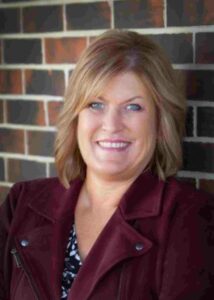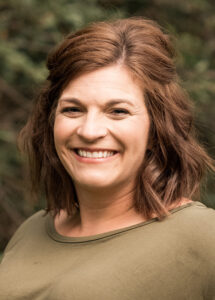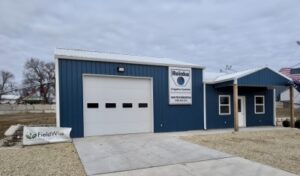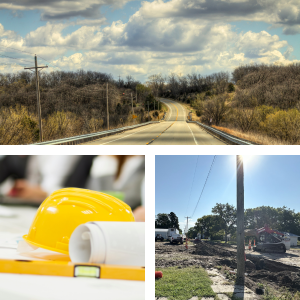
Congratulations to the 2025 Rural Voices Youth Contest scholarship winners!
Two high school seniors from North Central Kansas have been named winners of the 2024-2025 Rural Voices Youth Contest, which has been sponsored by the North Central Regional Planning Commission (NCRPC) of Beloit since 2006.
Alliana Thomasson, a senior at Ellsworth Junior/Senior High School, and Nicholas Niewald, a senior at St. John’s Catholic High School, submitted the winning entries for this year’s contest. Each recipient will receive a $1,000 scholarship and the honorary John R. Cyr Rural Voices Award, named after Cyr, who served as the NCRPC Executive Director for 22 years.
The NCRPC invited high school seniors from the 12 counties in its service area to submit an original essay or video expressing their perspectives on the contest theme for 2024-2025, “Rural Kansas…My Hometown.” The eligible counties included Clay, Cloud, Dickinson, Ellsworth, Jewell, Lincoln, Marshall, Mitchell, Ottawa, Republic, Saline, and Washington. Since the contest began, more than $33,000 has been awarded to high school seniors from the region.

Thomasson

Niewald
“This contest provides an annual opportunity for us to hear perspectives from the youth in our region. We learn about their hopes for the future of their hometown and what they value about rural Kansas,” said Deb Ohlde, the Interim Executive Director of NCRPC. “We appreciate the effort from all our entrants and wish them the best in their next educational endeavors.”
Learn more about the contest.
The Wickedest (and Best) Cattle Town in the West
By Alliana Thomasson
Every afternoon during the school day, I walk into a brightly decorated kindergarten classroom filled with the chattering voices of nineteen young children. I am greeted with warm hugs and cheesy, sometimes toothless smiles. Some days, I help craft colorful art projects. Other times, I quiz the students on letters and short words, lighting up with joy as I witness them learn and grow.
Each face I see in that warm classroom is a reflection of my own. When I was a year old, my family moved to the inviting small town of Ellsworth, Kansas. I was raised in this town and attended kindergarten in the very school where I now help as a classroom aide. Sixteen years later, I am still a part of Ellsworth’s tight-knit community.
Ellsworth- known as “the wickedest cattle town in the West” and the inspiration for a Rascal Flatts song- welcomed my family with wide-open arms. My mother met her current best friends at a playgroup at the local park. The kind, friendly people here are just a glimpse of what Ellsworth truly is.
In fact, Ellsworth’s trademark is a friendly “hello.” Whether it is my track coach at Gene’s Heartland Grocery, my old babysitter at Sugar Shack, or “Grandma and Grandpa Bearcat” at a basketball game, everyone greets me warmly. I work at a local coffee shop, where I have learned not just customers’ orders, but their names and stories. So, when I see them walking downtown or heading into one of the thriving local businesses, I always say hello.
When I was a kindergartener in a lively classroom, I believed I had all the time in the world. But time moved faster than anyone could have expected. When I walked across the track with my dad during the homecoming football game, smiling at a crowd filled with familiar faces, I had to fight back tears. Earlier that day, I rode in a truck bed during the annual homecoming parade, waving to the kindergarteners I see daily. Someday, they will be the ones riding in parades and pondering the same question I ask myself now: “How can I leave the only place I’ve ever known? How can I leave my home?”
The dictionary defines “home” as “a place of residence.” While this is true, it doesn’t capture what Ellsworth has become for me. Living in Ellsworth has been one of the greatest gifts of my life. It has given me my closest friends and exemplary role models. There are a few key ways that Ellsworth stands out against other communities.
During the COVID-19 pandemic, I was in seventh and eighth grade, a critical time for social and emotional development. Instead of being isolated in our homes, the community found creative ways to bring people together safely. One day, the town organized a “drag main” event, where families drove up and down Main Street, waving to friends through car windows.
Ellsworth has also given me freedom and safety, especially as an adventurous youth. My friends and I rode our bikes six feet apart down bright red brick roads during the pandemic. Few places offer the kind of security where children can play outside unsupervised, but Ellsworth is one of them.
Furthermore, the community spirit in Ellsworth is unmatched. During my junior year of high school, the football team advanced farther than it had since 1987, and the whole town celebrated. The stands were packed, and elementary students decorated lunch bags with messages of support for the players. The schools in Ellsworth are very important to the entire community. Younger students watch the high school musical and cheer alongside cheerleaders, forming valuable role models and seeing their future selves in the school’s spirit.
Ellsworth also provided me with excellent academic opportunities. USD 327, the district encompassing our schools, hires incredible teachers who are deeply invested in their students’ success. The district’s mission is to “provide an exceptional education experience and encourage responsible citizenship,” and they truly live up to it. Meetings are regularly held to outline strategic plans, welcoming input from students and parents alike.
I have been supported as a future educator as well. I plan on studying elementary education in college. USD 327 provides the Donald A. Smischy scholarship, which it awards to students who plan to come back and teach in the district. This helps cover the cost of education and support future teachers. I dream of giving back to what has given me so much by teaching in Ellsworth someday.
In addition to a strong, successful, and supportive school system, Ellsworth boasts a museum, local restaurants, a coffee shop, small businesses, a nearby drive-in, a golf course, a pool, and a library. The town’s motto, “A community with pride,” is well-earned. Anyone who visits quickly realizes they have stumbled upon a hidden gem.
As I prepare to pursue my dreams in college, I will proudly say I am from an incredible town in rural Kansas. The people that populate Ellsworth are the most hardworking, caring, and generous individuals I have ever known. Their unwavering support motivates me to be my very best, knowing I am backed by a community that believes in me.
Ellsworth’s beautiful sunsets and charming downtown make it a wonderful place to live, but it is the people who make it extraordinary. From memorable homecomings to heartfelt hellos, from pandemic resilience to excellent schools, Ellsworth has left an unbelievable mark on me.
If I could tell those kindergarten students I see daily one thing about where they live, I would remind them how lucky they are. In a world where so many high school seniors are eager to leave, I feel privileged to be from a place that will be so hard to say goodbye to. As college approaches, I hold my memories close, from the streets I’ve memorized to the people I cherish.
It may seem like I am describing just another average small town. But this essay is my attempt to encapsulate what this wonderful place means to me. Ellsworth, Kansas has truly put the “home” in being my hometown.
Rural Kansas… My Hometown
By Nicholas Niewald
“Reveal the hidden. The life that people miss. The unnoticed. Paint them a picture. Chisel them a sculpture. Illuminate your thoughts. Carry them with you in your back pocket to remind you of this place you call home,” he whispered. But Grandpa, how would they understand? Could they even? What if they think it’s nonsense? “Grandson, I know it will be challenging. I know exactly what you are going through. You forget that I grew up here too. Just tell them what you remember your hometown for. They may not ever understand, but do not worry; what it means is worth sharing, even if they cannot comprehend.” I see. Then I will tell them.
***
When I was eleven years old, I was gifted a field guide of North American birds, a hefty weight for a scrawny little kid to lug around. I carried that 400-page field guide with me everywhere I went, from barbeques to sporting events to school. It didn’t take me long to realize that I had found a deep love for birds. I bought a pair of binoculars, and biked all over town searching for them. Having practically memorized the field guide after a couple of years, I soon became known to my friends as the “bird nerd.” When Covid came around, I was a middle-schooler with a lot of free time on my hands: I often went birdwatching once or even twice a day. My sight identification of local birds was automatic. Now, as I sit on the saggy old couch of my living room that is older than I am, I think back to those days of my youth. Back then, in my early days of birdwatching, it was all about the thrill of the chase. Go, go, go, my mind told me. “Adventure is out there!” as Charles Muntz from the Pixar animated movie Up proclaims. I was finding new species left and right, including sixteen species never before observed in my home county. In 2020, I found 198 different species of birds throughout the state of Kansas. As soon as I could drive, I tore across the local highways to expand my birdwatching horizons. I always charged forward, eyes peeled, looking for birds. I loved it. But slowly, life started to demand more of me as I got older, providing fewer chances to go outdoors. My species counts shrank year by year. Time had to be devoted to studies, sports, and other activities – thoroughly enjoyable yet extremely time-consuming. When I did find the time to go birdwatching, I wasn’t finding new species as much as I used to. Conundrum.
My parents tell me that time is a strange phenomenon, and I start to see what they mean. Somehow the years elude me, and long gone are the dog days of summer with nothing to do. High school hit the fast-forward button on the life remote, and somehow I can’t find the stop/rewind button. During the school year, I spend most of my time outside the 8-hour school day doing homework, sports practices, or traveling to games and other activities. This was when birdwatching started to fill a different niche in my life. Instead of the high-intensity fast-paced visual adventure it used to be, it started to become an auditory experience. When I found an open window of time in between the demands of homework and sports practice, I leapt on the opportunity to escape to the wild, where all the stress and pressure of life vanished. Rather than chasing birds, I sat still instead. And I breathed. Breathed in, breathed out. Deliberately. Tuning in to nature. I waited, patiently, for them to come to me. I started to listen. And they came. The birds and other animals magically seemed to appear whenever I paused and made no noise. Barred Owls peeked out from the oak canopies. Woodchuck popped out of his burrow. Painted Turtles craned their necks from the creek. Suddenly, I became present to my surroundings, and it was a mystic feeling. You see, life was a blur of movement, and I didn’t know how to slow down. It felt like I was out of control, and I didn’t know how to use the brakes. When I discovered how to listen to nature, I soon realized that I could apply it to the art of living. I learned how to pause, slow myself down, and listen for the subtle, elusive messages life was trying to tell me. It worked. When the next difficulty presented itself, whether it was a large homework load on a night I had to travel, an argument I was getting into with a classmate, or yet another chore I forgot to do at home, I paused to recall what I learned while birdwatching. I listened. And out came opportunity from hiding. I found it, and rejoiced in it. The opportunity was there, waiting for me to stop getting tangled in the weeds of day-to-day living and remember the big picture of life. It worked. I solved my problems, smiled, and moved on. It worked.
***
“I have an idea, grandson. Tell them about how you try to catch bullfrogs. Tell them how it reveals the power of silence away from the noise of the big city, and the beauty of your rural Kansas stomping grounds.” Gee, thanks Grandpa. How could I forget to talk about those? I would’ve never thought to tell them.
***
So there I was, deep in the heart of summer. Dog-day cicadas droned in the cottonwoods, stuck on a nasal E note of a memory they forgot to sing. A breeze from the south moseyed by Chautauqua Park, carrying faded sounds of laughter from over where other people spent hot summer days blasting cannonballs and enjoying life in the clean, chlorinated, civilized waters of the city swimming pool. But elsewhere in the park, untamed silence reigned. Both Noise and Movement had long since left for summer vacation. In the murky waters of the Solomon, I crouched like a predator, shirtless and shoeless. Putrid, filthy river mud oozed up to my shins. I was keyed in to one singular space on the river bank. The space was occupied by a green, alert mass of muscle, eyes, and ears commonly known as the American Bullfrog. And I was going to catch him bare-handed, an ultimate test of one’s patience, wits, and coordination.
It’s important to note that bullfrogs fall prey to many predators, from herons and raccoons to snakes and turtles. Therefore every second of the day they must remain alert to survive, and let me tell you, they do an excellent job at that. Aided by near-360 degree vision, keen hearing, and muscular legs that allow them to jump to the safety of deep water, they are no easy task for a bare-handed, scrappy Kansas boy to catch with nothing but his hands. Searching for the frogs themselves is a challenge in and of itself, because their brown-green bodies blend into the river bank remarkably well. Upon spotting one, it only gets harder. Oftentimes, you have to stalk them from over 30 feet away. One sudden movement and they blurt out an alarm call, skipping into the river and alerting the others of your presence.
But I’ve found one now. My heart leaps into my throat, and adrenaline rushes out of the gates like a horse at the Kentucky Derby. He’s gargantuan. If I’m lucky, I can creep up to grabbing distance in less than 5 minutes. The entire process has to be flawless, which takes loads of unrelenting patience. Most would call me crazy for loving this, but I am at home here. I am carefree and joy-filled. I’m not here to observe nature – I’m here to become a part of it. I am literally immersed in it; gnats buzz around my ears, I’m getting torched by the sun, and I can still smell the stench of river mud as lazy water flows around me. Yet I am at home here, deep in the heart of a rural Kansas summer. I block out the distractions and breath deeply, relaxed. My eyes haven’t left the bullfrog for 15 minutes now – this mean green ribbit machine allows zero mistakes. He remains motionless and emotionless, holding the best poker face I’ve ever seen in my life. Minutes pass like days, and time is held captive in the stagnant summer air hovering over the Solomon River. My brain shuts off all thought processes, and instincts kick in. Before I know it, I have reached the next crucial checkpoint, the 5-foot circle. Having made it this far could be considered a miracle. Up to this point, the water has been up to my waist, but as the water shallows out towards the bank, I must crouch to keep my body concealed underwater. Poker-face still hasn’t moved. My knees embrace the soft mud, and my hands creep up the bank to get in grabbing position. Time stops. I don’t breathe. Life as I know it is suspended in place.
And then I lunge. I go for the gold. Silence is dethroned as I thrash out of the water, a muddy blur of determination. My hands reach out, and I can feel him. As soon as I grasp Poker-face, he slips out of my hands and into the Solomon. Barking out a dignified shout of disturbance, the behemoth bullfrog buries himself in the depths. I am left on the bank, reveling in awe of what just happened and grinning ear to ear, left with slimy hands that taunt me of how agonizingly close I was to ultimate success. Poker-face was in my hands, and I let him slip away. But I wasn’t disappointed: I already had what I wanted. I had the memory.
***
“Tell them the story of that one sleeping fox you tried to sneak up on. I love hearing that one, Grandson. I feel like I’m a part of it every time.” Alright. Let me think.
***
School had been difficult that day. It was the middle of a dreary, frigid week in December, and I had struggled to stay focused in classes due to multiple nights of insufficient sleep. I had a pile of homework to do, and I couldn’t think straight. I felt like Atlas trying to hold up the world with a calf cramp. Thankfully, I had the freedom of an open, empty afternoon, so I beelined for my favorite spot by the river to clear my mind. I walked there with only a pair of binoculars. No goals, no worries, no new bird species to find. Just to be. As I arrived, I crossed a bridge into a wooded area snaked by a dry creek bed. Coming to a pause, I looked around me into the winter quiet, and exhaled. I paused, and let go. All my stress diffused into the surrounding silence, carried away by the biting north wind and forgotten. I was alive again. Then fox revealed himself. His body was curled up on the ground. His face covered by his bushy tail, he lay asleep. Immediately, I thought of a challenge – to see how close I could get to him before I was noticed. It would be a stunning feat, one to brag about if executed properly. But what stood between me and the fox was a giant minefield of dry, crunchy leaves that crackled upon the slightest touch. As I concocted the strategy in my head and mapped out, I kid you not, a literal step-by-step route, I remembered that foxes have the best hearing out of any living creature in Kansas. The odds were heavily stacked against me – all the more reason to give it a try. And off to the races I went, as quiet as a nest of monasteries.
***
“You shouldn’t have said off to the races. It took you eons to get halfway there!” Shhh, Grandpa you interrupted! I shouldn’t have said off to the races, you’re right. You know what I mean.
***
Step. Pause. Scan for the next gap in the leaves. Wait a few seconds, and repeat. Step. Pause. Scan for the next gap in the leaves. Wait a few seconds, and repeat. Stop! Fox shifted napping position. I froze mid-step with my right leg hung in the air, left calf strained to keep balance on my tip-toed left leg, praying he didn’t open his eyes. One twitch and it would all be over. Agonizingly motionless, I frantically scanned for a place to land before I lost balance. Phew, I found one. Back to work. Step. Pause. Scan for the next gap in the leaves. Wait a few seconds. The process depends on silence. Efficiency of movement isn’t an option; at one point, I even had my back turned to him to find an open patch of soft, quiet dirt. Then, I realized the strangeness of my predicament. What a situation I was in! It’s not very often you find yourself in a world where silence has exclusive priority. There was no room for error, which made my runny nose an excruciating burden. One sniffle was all Fox needed to detect my presence. I didn’t know how much time had passed by now, but I had only moved a dozen yards or so. This was one of those rare life moments where I had enough patience to tolerate slow progress. I savored every moment of it like Grandma’s poppyseed bread, taking my time not only because I enjoyed it, but also because there was no rush. In this unique situation, there were no demands on me. No deadlines to meet, nothing to turn in, no time limit, no pressure. I was the underdog. No one expected me to surprise the fox, and the laws of nature were in heavy favor of the acute-hearing chicken terrorizer rather than a mere American teenager. It was liberating. I scanned the ground ahead and found a patch of open grass without leaves. It was a stretch, but I lunged out and stealthily landed my right foot. Success. Then came the left leg. As I rocked forward, I brought it up to balance and stood still. Something else caught my attention: four squirrels were chasing each other through some hackberry trees raucously, disturbing the peace. I eyed them for some time, and then refocused on the task at hand. As I raised my leg to move forward, I froze. Fox was staring at me, cold yellow eyes piercing my soul. Time was again suspended in place as man eyed fox and fox eyed man. We spoke for hours in that fleeting exchange of glances. He regarded me, and I acknowledged him. It was a delicate equilibrium, a tipping teeter-totter between the tangible and the surreal. And then, ever so slightly, I tipped the teeter-totter. The look vanished from his eyes, replaced by one of fear and survival. He bolted across the creek and out of sight as I lost balance from standing on one leg. My feet crunched into the leaves, and time fell crashing back through the treetops. It was over, and I had come so close yet again. Another memory had etched itself into my mind.
These stories are my hometown. No other place on earth is able to provide these priceless experiences I’ve had living in rural Kansas. Many consider this place flyover country, yet fail to see the hidden beauty it contains. It’s invisible to those caught up in the rush of life, occupied with the day-to-day business of their own little worlds. Although you often have to deliberately search to find it, the beauty of my hometown is well worth the search. I know for a fact that my grandpa found it. He too grew up in rural Kansas, and lived here for the good majority of his life well-associated with the land. He was an avid goose hunter, experienced hunting guide, and worked for Reiter Land Company, which meant he knew this place and all its backroads like the back of his hand. I never got to meet him, because he died of cancer a few months before I was born, so I hold these memories close to my heart in his honor. He knew that rural Kansas has a strong connection to nature, which is something I treasure very deeply. My hometown has provided me with many countless memories that no other place can reproduce. Its backyards provide front seats to spring bird migrations. Sunrises and sunsets are an artist’s canvas, with flamboyant pinks, oranges, yellows, and blues spilling across the sky and into the clouds to produce stunning pictures. Toads, squirrels, hawks, snails, and everything in between call this place home too. Orion the constellation salutes me every night in fall and winter, surrounded by a black sea studded with diamonds, aiming his bow ad astra per aspera. What I have shared with you is why rural Kansas is truly my favorite destination on Earth, and I’m sure it was Grandpa’s too. Rural Kansas contains my childhood, my friends, my family, and my home. It is home. And I would trade nothing else for it.




 The NCRPC is excited to announce the establishment of a new endowment fund dedicated to supporting science education and the arts in the area.
The NCRPC is excited to announce the establishment of a new endowment fund dedicated to supporting science education and the arts in the area.




 As part of the NCRPC’s Thriving Communities designation by the Department of Transportation, we have a small allocation of funding to assist communities in funding a preliminary engineering report (PER) for a transportation, water or sewer project. PER preparation for transportation projects will be highest priority. Interested communities should reply on or before January 8, 2025.
As part of the NCRPC’s Thriving Communities designation by the Department of Transportation, we have a small allocation of funding to assist communities in funding a preliminary engineering report (PER) for a transportation, water or sewer project. PER preparation for transportation projects will be highest priority. Interested communities should reply on or before January 8, 2025.